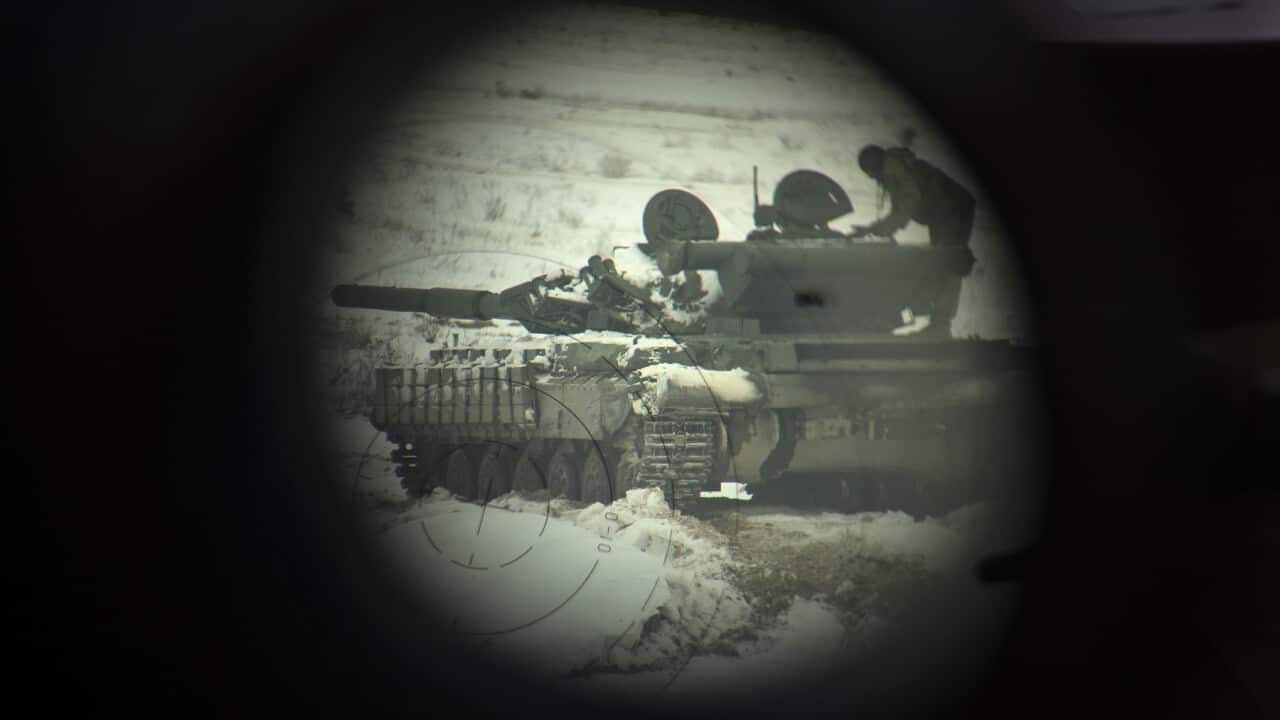TRANSCRIPT
2023 began and ended with war and conflict.
The year opened with Ukraine continuing to fight to expel Russian invaders after they launched their attack in February of 2022.
The ground war remained largely a stalemate throughout the year.
Tens of thousands of Ukrainians living downstream from a hydro-electric dam on the Dnipro river faced severe flooding after it was blown up - Russia blamed Ukraine, Ukraine blamed Russia.
In June, the Wagner group of mercenaries which had been working with Russia in Ukraine revolted against Moscow, took over the city of Rostov on Don, and marched towards the Russian capital.
Belarus's President brokered a deal which brought the revolt to a halt.
Wagner Group leader Yevgeny Prigozhin was mysteriously killed in a plane crash two months later.
Ukraine's president Volodymr Zelenskyy has denied any Ukrainian involvement in the crash and says he has no doubt who is responsible.
"Well, first of all, we don't have any connection to this situation, that's for sure. I think everyone understands who is involved.”
The International Criminal Court issued arrest warrants for Russian President Vladimir Putin - though not in connection with Prigozhin's death - while international backing for Ukraine largely remained intact.
Conflict has been the name of the game in United States politics this year.
At the centre - again - has been former President Donald Trump, who has not only attacked current President Biden, but also members of his own Republican party.
He is determined to be the next President of the United States, even though he has been indicted in relation to his financial dealings, in connection with his handling of classified documents and over his alleged attempts to overturn the result of the last election.
His former Vice President, Mike Pence, says Mr Trump asked Mr Pence to consider him first, not the Constitution, but he chose the Constitution.
“I've been very clear. I had hoped it wouldn't come to this. I had hoped that this issue and the judgement of the president's actions that day would be left to the American people. But for my part, I want people to know that I had no right to overturn the election and that what the president maintained that day and frankly, has said over and over again over the last two and a half years is completely false.”
Meanwhile, the Republican Party struggled to appoint a Speaker, a central role in the House of Representatives.
Kevin McCarthy became Speaker of the House on January 7th, after the longest multi-ballot speaker election since 1859.
By October, he was out, after a split in the Republican caucus saw five Republicans vote against him.
After four more ballots, he was replaced by Mike Johnson, who is the current speaker.
At least, he is for now...
But when it comes to basket cases, it's difficult to beat Britain.
Their current Prime Minister, Rishi Sunak, has managed to stay in his job for over a year, after replacing Liz Truss, who in turn replaced Boris Johnson.
Mr Sunak's government has been embroiled in an immigration crisis, a cost of living crisis, a health service crisis, a disintegrating school buildings crisis and a number of economic problems due to Brexit.
The immigration crisis revolves around a plan to send asylum seekers to Rwanda - a move ruled illegal by the Supreme Court, because it said Rwanda was not a safe country.
Mr Sunak's solution was to create legislation that declares that Rwanda IS a safe country.
“We will take the extraordinary step of introducing emergency legislation. This will enable Parliament to confirm that with our new treaty, Rwanda is safe. It will ensure that people cannot further delay flights by bringing systemic challenges in our domestic courts and stop our policy being repeatedly blocked.”
And while Britain is reeling from inflation and the increasing cost of living, questions were raised about why so much money was spent on the coronation of King Charles the third.
Royalists pointed to the estimated $3 billion the Royal Family brings into the U-K economy from tourism, trade and endorsements.
Opponents said the nearly $200 million it cost to stage the coronation was simply a display of wealth and privilege for an outdated institution.
In a ceremony dating back a thousand years, the new King was crowned in Westminster Abbey:
ARCHBISHOP: "Will you solemnly promise and swear to govern the peoples of the United Kingdom of Great Britain and Northern Ireland, your other realms and the territories to any of them belonging or pertaining, according to their respective laws and customs?"
CHARLES: "I solemnly promise so to do"
ARCHBISHOP: "Will you to your power cause law and justice in mercy to be executed in all your judgements?"
CHARLES: "I will.”
In a year of major weather events - storms, floods, fires, heatwaves - one of the worst events was the destruction of the historic Hawaiian town of Lahaina by a bush fire, driven by fierce winds.
It was the deadliest United States wildfire in more than 100 years and destroyed or damaged more than 2,200 buildings.
100 people lost their lives.
This resident said the speed of the fire was terrifying.
“There was no warning. I was paying attention on my phone to the news. Okay. Oh, it's so many hundreds of miles down. We're going to have some strong winds. It's going to play havoc with our trade winds. Nothing to worry about. Okay. The next day when the storm passed by, okay, all of a sudden my apartment went black. Oh is it going to rain? When we open the door it was orange from the fire.”
Climate change was blamed for the ferocity of the blaze - and the calls of climate scientists for immediate action to be taken were a recurring theme of the year.
But the COP-28 climate change conference at the end of the year in Dubai proved to be a disappointment for many with a reluctance to push for fossil fuels to be phased out.
But global news since October has been dominated by one story...
(Music) "Israel batters Gaza in retaliation for a Hamas militant attack that has killed at least 600..." (fades)
The attack by Hamas took the Israeli government - and indeed, the rest of the world, by surprise - though it later emerged that there had been clues that some action had been planned, which were missed by Israeli intelligence.
Israel's response was swift and intense, as they attacked Gaza to, in their words, eliminate Hamas.
Israel claims Gaza is riddled with locations used by Hamas to store and launch weapons - including hospitals, schools and residential buildings.
Hamas denies it.
As more and more of Gaza and its infrastructure was destroyed, a humanitarian crisis of massive proportions saw hundreds of thousands of Palestinians homeless, and lacking in basic needs.
A UN delegation in December was shocked at what they saw at the Rafah crossing between Egypt and Gaza - one of those was Russia's permanent representative to the U-N, Vassily Nebenzia:
“It is, one time to see it, it's worse (than) ten briefings. When you see it with your own eyes, when you visit the hospital, when you see how the humanitarian assistance is being basically prohibited to enter Gaza despite the catastrophic situation, the dire situation of the Palestinian people in the strip.”
As a New Year dawns, many of the major issues facing the planet in 2023 will continue to drive the news agenda in 2024.













